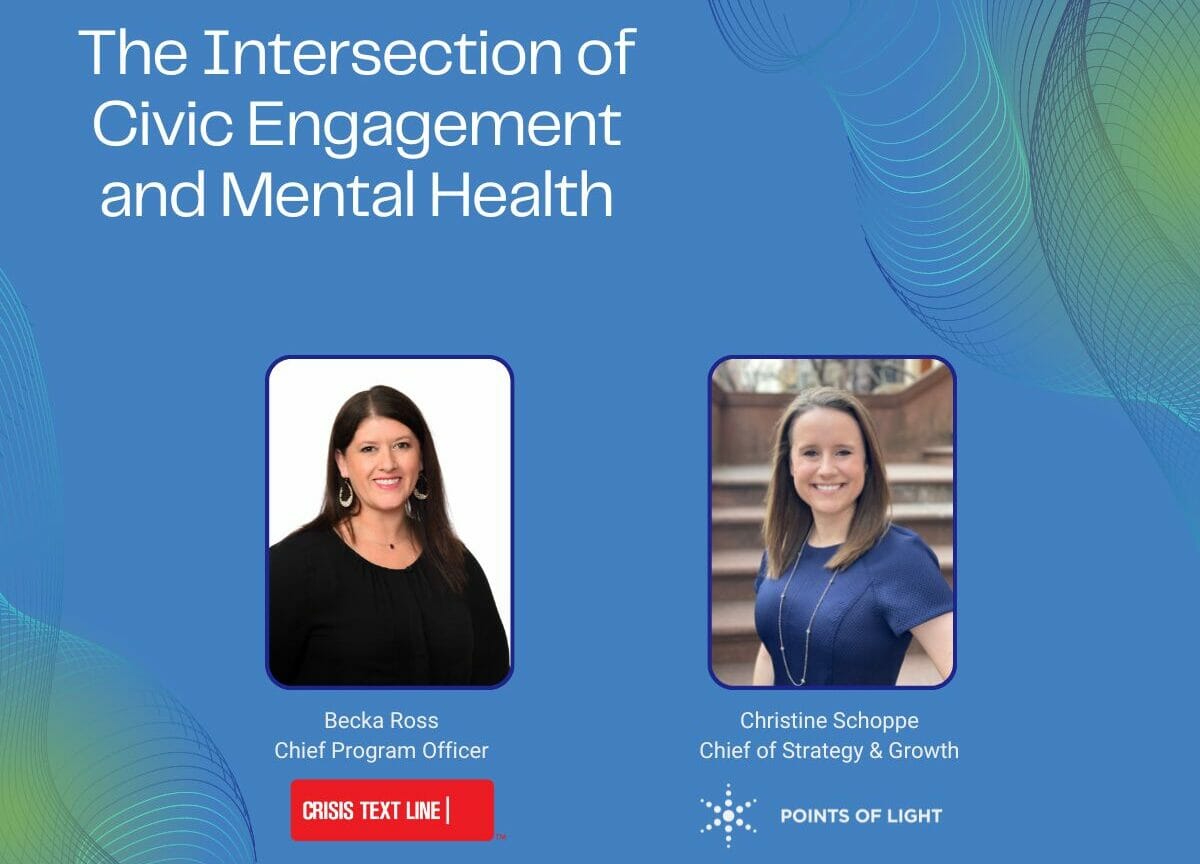How to Support Volunteer Engagement at the Intersection of Civic Engagement and Mental Health

What do civic engagement and mental health have in common? Points of Light Chief Growth and Strategy Officer Christine Schoppe and Crisis Text Line Chief Program Officer Becka Ross got together to talk about these two cause areas and how they intersect, starting with an overview of each organization.
Since 1990, Points of Light has acted as a cultural catalyst, working in partnership with businesses and individuals to build a world where it’s impossible to sit on the sidelines. Through its corporate partners and 177 affiliates in 38 countries, the organization has mobilized 5 million volunteers. In recent years, Points of Light has worked to define a new kind of civic engagement for the 21st century, one that calls on people to give their time, talents and resources to build a brighter future for everyone.
Crisis Text Line began in 2013, hosting more than 7.5 million conversations around mental health since its launch. The organization provides text-based crisis intervention by empowering a community of thousands of trained volunteers to support people in their moments of need. The service is offered in the U.S., Canada, the U.K. and Ireland. It’s free, anonymous and available round-the-clock.
Both organizations have a deep understanding of mobilizing volunteers and a focus on research in their respective cause areas.
Research Shows That Civic Engagement and Mental Health Go Together
“There’s a lot of research out there around the mental health benefits of volunteering combating loneliness in particular,” said Ross. “Volunteers are telling us that they are using their training in their personal lives, too, and it’s improving romantic relationships and work relationships and being able to build the skill of empathy and understand the importance of validating somebody’s perspective”
Crisis Text Line’s research is open-source, sharing data-informed insights into mental health with other nonprofits, corporate partners, policymakers, media and the general public to raise awareness around mental health issues.
Points of Light’s body of civic engagement research is also shared publicly and shows that four out of 10 people see mental health as a top cause area of concern. This cause area tops a list of more than 20, including poverty and gun rights. These trends, led by Gen Z and Millennials, have changed the way the organization has thought about civic engagement, prompting the development of the Points of Light Civic Circle, a framework of nine pathways to civic engagement. These pathways include volunteerism, listening and learning, using your voice and being strategic when choosing where you work.
“The company you work for, and the internal volunteerism you can do there. The resource groups you can join to advocate for your kind of special interest group, you can use your place of employment to express your values and your beliefs,” Schoppe pointed out. “There’s more than one way to get it done.”
In addition to choosing a workplace that supports your values, Points of Light research shows that the two of the most common actions people are taking to advocate for the issues they care about are listening and learning, and using their voice. However, volunteering remains one of the most valued pathways to civic engagement, which means that keeping volunteers invested is essential.
Keeping Volunteers Engaged is an Essential Part of Retention
Volunteer retention and keeping people motivated can be a challenge for many nonprofits as well as CSR and ESG programs in business. Points of Light research shows that a strong motivator for people when choosing which social issue to champion is having personal experience around that issue. That connection and personal investment is central to strength and longevity of commitment.
Schoppe and Ross touched upon how to find willing volunteers and how to retain and incentivize them to keep up this work. Efforts should reach beyond how meaningful the work itself is.
“Many of our volunteers come to us because they want to make an impact and make a difference in somebody’s life. [Our crisis counselors] are really changing the mental health landscape, reducing stigma, ensuring that people know that it’s okay to reach out for help and get support,” said Ross. “We center our volunteers and their experience.”
Crisis Text Line knows a lot about volunteer engagement with a volunteer base of more than 55,000 people who have gone through a 30-hour virtual training to become crisis counselors. One of first things volunteers are asked to do is create a self-care plan, so they can recharge after a tough shift.
This type of thoughtful method of supporting a volunteer force is essential to sustainability as volunteerism remains one of the most valued pathways to civic engagement. Points of Light research shows that the top three actions people are taking around the issues they care about are: volunteering, listening and learning, and using their voice.
Schoppe said, “That’s really what drives our research is understanding those goals, and then creating insights and actions with our ecosystem.”
Listen and Learn About the Intersection of Civic Engagement and Mental Health
Watch the entire conversation between Points of Light Chief Growth and Strategy Officer Christine Schoppe and Crisis Text Line Chief Program Officer Becka Ross:
